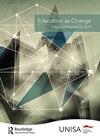Phyllis Ntantala: An African Woman’s Leadership in the Struggle against a Pan-Eurocentric Education
IF 1
4区 教育学
Q3 EDUCATION & EDUCATIONAL RESEARCH
引用次数: 0
Abstract
The years 2021 and 2022 marked a significant period in the Pan-African struggle against the Pan-Eurocentric academy’s destruction of African dignity and freedom. 2021 marked the 70th anniversary of the Eiselen Commission’s report on Bantu Education. 2022 marked the 30th anniversary of the publication of Phyllis Ntantala’s autobiographical work, A Life’s Mosaic: The Autobiography of Phyllis Ntantala. Ntantala’s book documents African teachers’ and parents’ resistance to Bantu Education, which culminated in some African teachers being fired for refusing to “poison the minds” of African children. While the “heroism” of resistance to Bantu Education is well-recorded and celebrated, the “sheroism” of the struggle against Bantu Education is less illuminated and appreciated. This article, by examining Ntantala’s intellectual legacy in African people’s struggles for justice—including justice in education in South Africa, as well as in Europe and the United States of America—celebrates African sheroes’ institutional leadership in the struggles associated with education in politics and politics in education. A critical examination of Ntantala’s leadership against Bantu Education gives recognition to an important, yet often overlooked, aspect in decolonisation and re-Africanisation struggles in education, namely, that colonialism did not only express itself through racism, but also sexism.菲利斯·恩坦塔拉:非洲妇女在反对泛欧洲中心教育斗争中的领导地位
2021年和2022年是泛非反对以泛欧为中心的学院破坏非洲尊严和自由的重要时期。2021年是艾泽伦委员会发布班图教育报告70周年,2022年是菲利斯·恩坦塔拉自传体作品《生命的马赛克:菲利斯·恩坦塔拉自传》出版30周年。恩塔塔的书记录了非洲教师和家长对班图教育的抵制,最终导致一些非洲教师因拒绝“毒害”非洲儿童的思想而被解雇。虽然反抗班图教育的“英雄主义”得到了充分的记录和颂扬,但反对班图教育的“英雄主义”却很少得到阐释和赞赏。本文通过考察恩坦塔拉在非洲人民争取正义斗争中的思想遗产——包括南非以及欧洲和美国的教育正义斗争——颂扬非洲英雄在与政治教育和教育政治相关的斗争中的体制领导作用。对恩坦塔拉领导反对班图教育的批判性审查,使人们认识到非殖民化和教育中再非洲化斗争的一个重要但经常被忽视的方面,即殖民主义不仅通过种族主义表现出来,而且通过性别歧视表现出来。
本文章由计算机程序翻译,如有差异,请以英文原文为准。
求助全文
约1分钟内获得全文
求助全文
来源期刊

Education As Change
EDUCATION & EDUCATIONAL RESEARCH-
CiteScore
1.40
自引率
0.00%
发文量
29
审稿时长
24 weeks
期刊介绍:
Education as Change is an accredited, peer reviewed scholarly online journal that publishes original articles reflecting critically on issues of equality in education and on the ways in which educational practices contribute to transformation in non-formal, formal and informal contexts. Critique, mainly understood in the tradition of critical pedagogies, is a constructive process which contributes towards a better world. Contributions from and about marginalised communities and from different knowledge traditions are encouraged. The articles could draw on any rigorous research methodology, as well as transdisciplinary approaches. Research of a very specialised or technical nature should be framed within relevant discourses. While specialised kinds of research are encouraged, authors are expected to write for a broader audience of educational researchers and practitioners without losing conceptual and theoretical depth and rigour. All sectors of education are covered in the journal. These include primary, secondary and tertiary education, adult education, worker education, educational policy and teacher education.
 求助内容:
求助内容: 应助结果提醒方式:
应助结果提醒方式:


